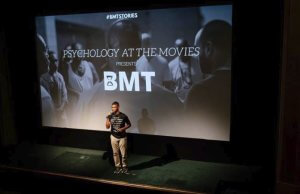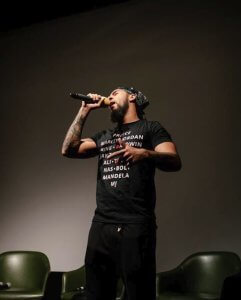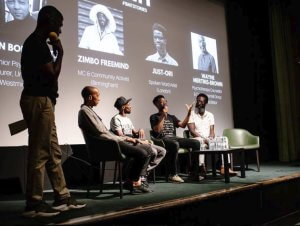
“This is a therapy session in of itself” said BMT founder, Alain ‘Fusion’ Clapham, aptly describing the film screening and discussions hosted by Psychology at the Movies in conjunction with BMT. On Thursday 19th July, BMT and Psychology at the Movies joined forces to undertake the big task of exploring toxic masculinity and emotional vulnerability amongst Black men.
Psychology at the Movies meets monthly to host in-depth discussions on the thematic elements of films. Previous films have included Fight Club and The Usual Suspects. BMT, which stands for Black Man Time, is part of Industry in The Streets, a creative youth agency that develops projects that aim to improve the quality of life for young people. BMT specifically focuses on the Black British community.
Held at Regent Street Cinema, BMT and Psychology at The Movies screened the award-winning film ‘The Work’, a documentary filmed inside Folsom State Prison which follows a four-day group therapy session between prisoners and volunteers from the outside world. Poets Just-Ori and Broken Pen performed spoken word performances which were then followed by panel discussions featuring University of Westminster psychology lecturer Bryan Bonaparte, rapper and activist Zimbo Freemind, and psychotherapy counsellor Wayne Mertins-Brown.
Discussions around toxic masculinity and mental health issues are welcome, because for many of us who grew up before the 2010s, nuanced and sympathetic examinations of mental health in the Black community were absent. I still can remember the furore that arose after The Sun cruelly splashed on their front page “Bonkers Bruno Locked Up”, after boxer Frank Bruno was admitted into a psychiatric hospital. If it wasn’t treated as a priority, it was met with ridicule or apathy.

Against this backdrop, it’s hard not to view this event as being anything other than an exercise in catharsis. The event kicked off with fantastic spoken word performances from Just-Ori and Fusion, which centred on personal reflections on their individual hardships and anxieties. Both poets gave very engaging pieces, filled with brilliant wordplay, perfectly highlighting the role toxic masculinity has played in creating self-destructive tendencies. Poet and rapper Broken Pen closed the night with an emphatic and tremendous piece. Hearing such personal stories of their struggles to cope with internal demons, was a perfect segue into the screening of The Work.
In The Work all the prisoners are serving lengthy sentences due to extremely violent pasts. One prisoner, before his incarceration, attempted to literally saw a man in half with a knife. Another was a ‘shot caller’ for the Bloods gang. But The Work elevates itself from merely being a simple exploration of violence. In fact, the documentary doesn’t linger too much on their crimes. Instead the documentary digs deeper into the role personal trauma played in leading them towards a destructive path. Notably, unstable relationships with fathers are mentioned quite a few times as a catalyst for trauma. In their journey towards redemption and rehabilitation, the film is filled with scenes of men crying, men holding each other in their arms and listening to their stories of pain.
By delving into their trauma and depicting their attempts at redemption, the documentary achieves a spectacular humanisation of these prisoners. It doesn’t ask you to forget their crimes, but it does ask you to see them as hurt men, who not only could have been something greater with the right guidance, but conversely still have hope at achieving some peace. The film is brilliant, intense, and raw, with some scenes leaving the audience doubled over in laugher and others bringing many people to tears. I can safely say, it’s one of the most magnificent documentaries I’ve seen, and I’m glad BMT and Psychology at the Movies gave everyone the chance to view it.
The brilliance of The Work and its depiction of therapy as a mechanism for healing had a lot of resonance across the pond to the Regent Street cinema. To reiterate, the whole event was described as a “therapy session in of itself” and the panel discussion afterwards almost doubled up as one. People went beyond asking questions about the cinematic facets of the film and extrapolated the film into their own lives, using The Work as a springboard for analysing the toxicity of misguided masculinity amongst many Black men.

Counsellor Wayne Mertins-Brown made an essential crucial point to take away. He stressed the need for at risk Black men to go through counselling or therapy as early as possible, before they flirt with disaster.
One scene from the film, which succinctly addresses this need for intervention, is where one prisoner attempts to dissuade another from contemplating suicide. He pleads with him to rely on other prisoners for support; asking “why can’t we be enough to hang on to?”
If anything, hopefully this screening will inspire people to seek help when necessary and to support and acknowledge one another’s mental health.
Photography credit: Francis Augusto
Mark Mukasa
Latest posts by Mark Mukasa (see all)
- INTERVIEW | SELINA BROWN ON FAMILY, FOOD AND CULTURAL PRIDE IN HER NEW CHILDREN’S BOOK ‘MY RICE IS BEST’ — April 28, 2025
- EUROPEAN PREMIERE OF ‘PIECE BY PIECE’ STARRING PHARRELL WILLIAMS TO CLOSE THE 68TH BFI LONDON FILM FESTIVAL — August 20, 2024
- INTERVIEW | ILLUSTRATING INCLUSIVITY… A CONVERSATION WITH JOELLE AVELINO ON BRINGING HER BOOK ‘A BOOK FOR PEOPLE LIKE ME’ TO LIFE — August 9, 2024
